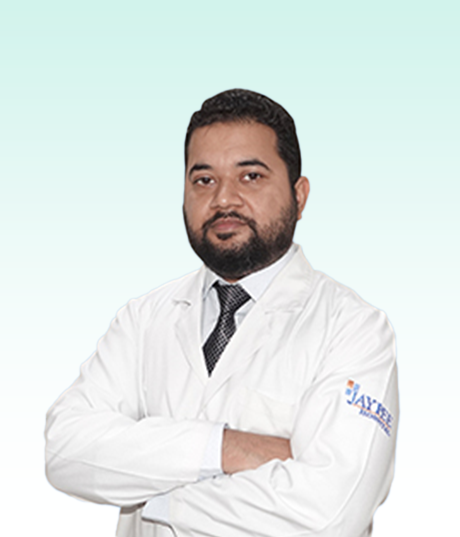Laryngectomy
A laryngectomy is the removal of all or part of the larynx. This is typically performed as treatment for advanced stage laryngeal cancer. It is a surgical treatment meant to preserve the voice. The larynx is above your trachea (windpipe), and it connects your nose and mouth to your lungs. Your larynx helps you speak, breathe and swallow.

Who needs laryngectomy surgery?
Laryngectomy surgery is recommended to them who are suffering from Laryngeal cancer, Laryngeal fracture, Severe larynx damage due to trauma or injury. Chondronecrosis of the larynx (a rare condition in which radiation therapy causes damage to your larynx). By identifying your whole condition your health provider will recommend a partial laryngectomy (removing part of your larynx) or a total laryngectomy (removing all of your larynx).
When to see a specialist?
If you experience a sore throat or cough that doesn’t improve, your voice changes, such as hoarseness, that doesn’t improve after two weeks, pain or other difficulties when you swallow, lump in your neck or throat, trouble making voice sounds (dysphonia) then you should seek medical attention right away.
Procedure
Anesthesia- General anesthesia will be given to keep you comfortable and pain-free.
The Incision- Your surgeon will make an incision on your neck through which larynx will be removed. Your surgeon removes either part or entire of your larynx. They may also remove some of your lymph nodes and part of your pharynx (throat).
Creating of stoma- After removing the larynx, the doctor will create the stoma, a permanent hole about the size of a nickel in the front of the trachea. It links directly from the outside to your lungs so you can breathe.
Perform a tracheoesophageal puncture (TEP)- Some people who have laryngectomies also have a tracheoesophageal puncture (TEP) performed. By going through the stoma, a small hole is created in both the trachea and the esophagus. This can be done at the time as the laryngectomy surgery or during a second procedure afterwards. Something must always remain in place within the TEP to keep it open.
Close the incision- Once the surgery is complete, your throat muscles and the skin on your neck will be closed with surgical stitches. You might have drainage tubes placed in your neck before you’re taken to the recovery room. The tubes drain the surgical site of fluids and blood for several days after a laryngectomy.
Recovery
You will probably need to take pain medicine for a few weeks. You may have a drain tube in your neck for 1 to 4 days after your surgery. You may have trouble swallowing for several days after you go home. Also, you may have numbness in your neck and weakness in your face. On average, it takes two to three weeks to recover after laryngectomy surgery. Some people need longer to recover.
Risks
There are several risks included.
Infection.
Blood clots.
Heart condition.
Breathing issues.
Benefits of laryngectomy surgery
Laryngectomy is beneficial to treat laryngeal cancer or severe larynx damage. People who undergo a laryngectomy can still have a good quality of life.
Frequently Asked Questions
What is laryngectomy?
A laryngectomy is a surgical procedure to remove part or all your larynx (voice box). It is used to treat cancer of larynx. Moreover, it is also done to treat gunshot wounds and other injuries.
How is laryngectomy surgery performed?
Your surgeon carefully makes an incision (cut) on your neck and will remove either part or entire your larynx. They may also remove some of your lymph nodes and part of your pharynx (throat). Then your surgeon creates an opening (stoma) in your neck and in the front of your windpipe. A laryngectomy tube is then placed in your stoma. This will help you breathe after your surgery. In some cases, who have laryngectomies also have a tracheoesophageal puncture (TEP) performed. By going through the stoma, a small hole is created in both the trachea and the esophagus. This can be done at the time as the laryngectomy surgery or during a second procedure afterwards. Once the surgery is done, your throat muscles and the skin on your neck will be closed with surgical stitches.
Is laryngectomy surgery painful?
Laryngectomy is performed under general anesthesia to avoid discomfort and pain during the whole procedure.
How long does laryngectomy surgery take?
Laryngectomy is a lengthy procedure that typically lasts between five to twelve hours. After the surgery, you will stay in the hospital for one to two weeks. Your medical team will track your recovery during this time.
What are the risks of laryngectomy surgery?
While laryngectomy is a safe procedure, various risks include infection, blood clots, heart conditions, breathing issues etc. Your surgeon will discuss the risks before the procedure.
Treatment Plans
- Trauma & intensive care $59
- Aged Care $29
- Community Services $25
- Diagnosis & Investigation $48
- Medical & Surgical $82
- Mental Health $74
- Rehabitation $24
- Specialised Support Service $19
- Trauma & intensive care $59
- Aged Care $29
- Community Services $25
- Diagnosis & Investigation $48
- Medical & Surgical $82
- Mental Health $74
- Rehabitation $24
- Specialised Support Service $19
Treatians As The Best Choice
Treatians understand that seeking medical treatment abroad can be a daunting experience for patients and their families. That’s why the company offers end-to-end support to its clients, from the initial consultation to post-treatment care. The company provides personalized treatment plans that are tailored to meet the individual needs of each patient, and its team of dedicated professionals is always on hand to provide guidance and support throughout the entire process. Contact us at +91-7982312582, drop your email [email protected]
- Trauma & intensive care
- Aged Care
- Community Services
- Diagnosis & Investigation
- Medical & Surgical
- Mental Health
- Rehabitation
- Specialised Support Service
Service Recipient Says

Oxmox advised her not to do so, because there were thousands of bad Commas, wild Question Marks and devious.
Kolis Muller NY Citizen
Oxmox advised her not to do so, because there were thousands of bad Commas, wild Question Marks and devious.
Kolis Muller NY Citizen



















Oxmox advised her not to do so, because there were thousands of bad Commas, wild Question Marks and devious.
Kolis Muller NY Citizen